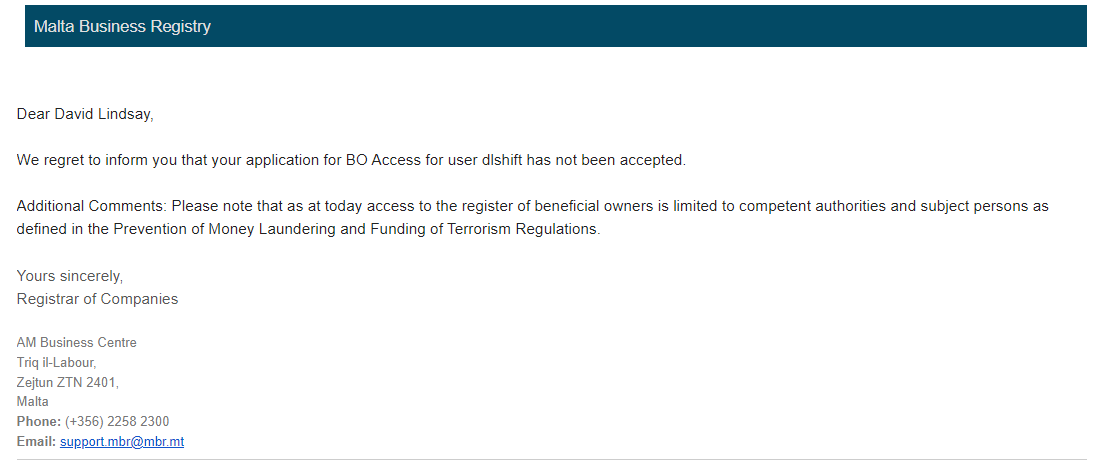Two different European parliamentary committees are of the joint opinion that member states’ registries of the ultimate beneficial owners of companies must be reopened to journalists and civil society organisations.
Malta had been in the first small wave of EU member states that was quick to abruptly close off access to their registries for journalists last November in the immediate wake of a European Court of Justice ruling.
The other EU states immediately restricting access along with Malta were, tellingly, Luxembourg and The Netherlands.
All three are infamous for protecting foreign financial interests that create brass plate shell companies in their low-tax jurisdictions, which, among more nefarious purposes, effectively allow them to evade the taxman in the countries in which they operate.
UBO registries contain sensitive and often concealed information on the people behind some of those companies’ intentionally opaque ownership structures.
Malta closed off its UBO register to journalists the day after the ECJ ruling. Malta’s UBO registry is held at the Malta Business Registry, which falls under the political remit of Economy Minister Silvio Schembri.
Journalists from The Shift, as well as other Maltese journalists, have applied through the MBR’s formal channels to be once again granted access to the register, in line with provisions of the ECJ’s ruling, but they have so far been flatly denied.

A letter from the MBR rejecting a journalist’s request for access to its UBO register.
But earlier this week the European Parliament’s Economic and Monetary Affairs and Civil Liberties, Justice and Home Affairs committees both voted to have the registers reopened to people holding a legitimate interest. Such individuals include journalists, civil society organisations and higher education institutions.
MEPs also want member states’ UBO registries interconnected and accessible to the same group of people who have a legitimate interest in accessing them.
The committees’ MEPs also voted for such access rights to be valid for at least two and a half years. While member states will automatically renew access, it can also be revoked or suspended if it is abused, according to the rules being proposed.
They also voted for information on beneficial ownership to be available digitally, in an EU official language plus English, and include current and historical information for a defined period.
The entity in charge of the central register will also have the right to request from corporate and legal entities any information necessary to identify and verify their beneficial owners.
This information will also have to be up to date and a failure to provide accurate and adequate data to registers will be sanctioned.
A resolution on the matter will go before the EP’s plenary later this month, after which parliament will begin negotiations with the European Commission and Council to hammer out the final legislation.
Council has already signalled its approval for EU registries to be opened as is being suggested by the committees, which puts the government in a tight spot after it rushed to restrict access to Malta’s Ultimate Beneficial Ownership registry.
In its agreement on the EU’s anti-money laundering ‘rulebook’ and on a new directive, the AMLD6, the Council of the European Union made it amply clear that “Member States should ensure that any natural or legal person that can demonstrate a legitimate interest has access to information held in the beneficial ownership registers, and such persons should include those journalists and civil society organisations that are connected with the prevention and combating of money laundering and terrorist financing.”
It is unclear what position Malta had taken at Council level after it was one of the first EU states to have jumped on the bandwagon and cut off access to its UBO register in the wake of its questionable interpretation of the ECJ ruling.
The government will now be forced to abide by an eventual EU-level agreement, meaning the Malta Business Registry will be obliged to backtrack and re-open its ultimate beneficial ownership register to at least the press and certain civil society groups.














Minister Schembri seems to have quite a lot on his plate. He seems to pop up when there are questionable actions by his ministry (alias minestrone with unknown ingredients).
With the many suspicions of “ untouchables “ being linked to various Maltese shell companies registered to less than salubrious characters, no wonder the MBR jumped at the opportunity to stop you pesky journalists sniffing around at the earliest opportunity.
Oh how wonderfully the institutions are working!
If I personally as a financial statements analyst need to access the register for my investigative articles, why should I be prohibited from doing so?
Are the government authorities gagging my human right to freedom to information to expose beneficiaries of corruptive practices?